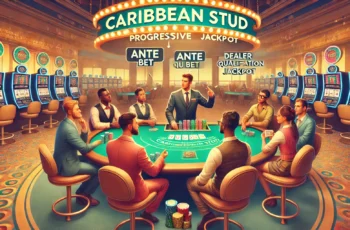Introduction
Slow rolling in poker is considered one of the most disrespectful actions a player can take at the table. It involves intentionally delaying the reveal of a winning hand during a showdown.
Here’s a more detailed breakdown:
- Context: During a poker game, when the final round of betting is complete, players reveal their hands to determine the winner. This is known as the showdown.
- Action: A player with a strong hand, usually the winning one, takes an excessive amount of time to reveal their cards.
- Intent: The delay is deliberate, meant to mislead opponents into thinking they have a chance to win or to create unnecessary suspense.
- Etiquette: This behavior is seen as poor sportsmanship and disrespectful. It can frustrate other players and disrupt the flow of the game.
Slow rolling undermines the spirit of fair play and respect that is fundamental to poker etiquette. It’s generally frowned upon in both casual and professional settings.
In the competitive world of poker, where strategy, skill, and psychology intertwine, the concept of slow rolling emerges as a contentious issue among players. This practice involves intentionally delaying the reveal of a winning hand at showdown, despite knowing it’s the best hand. Beyond its strategic implications, slow rolling raises significant ethical concerns related to poker etiquette and sportsmanship. This article aims to delve deep into what slow rolling entails, its impact on the dynamics of the game, and why it’s crucial for players to navigate this delicate aspect of poker with caution and respect.
What is Slow Rolling in Poker?
Slow rolling in poker occurs when a player takes an excessive amount of time to show their winning hand at the showdown, typically after opponents have already revealed their hands. It’s a tactic that introduces a dramatic pause into the game, often with the intent of provoking emotional responses from opponents or spectators. For instance, imagine a scenario in Texas Hold’em where one player confidently calls another player’s all-in bet, only to prolong the tension by delaying the reveal of their pocket aces until the last possible moment.
In the world of poker, etiquette and sportsmanship play significant roles in maintaining a respectful and enjoyable environment for all players. The video “What is a ‘Slow Roll’ in Poker?” delves into one of the most contentious breaches of poker etiquette: the slow roll. A slow roll occurs when a player with a winning hand takes an unnecessarily long time to reveal their cards, often giving false hope to their opponent. This behavior is widely regarded as unsportsmanlike and can lead to tension and frustration at the table. The video explains the implications of a slow roll and why it is considered poor form among poker players.
Building on the insights from the video, our blog will take a closer look at slow rolling in poker. We will explore the origins of this controversial tactic, its impact on the game, and the community’s strong reactions to it. By examining famous instances of slow rolls and the reactions they provoked, we’ll provide a comprehensive understanding of why this practice is frowned upon and how to avoid it. Join us as we delve into the etiquette of poker, highlighting the importance of respect and fair play in maintaining the integrity and enjoyment of the game.
Why is Slow Rolling Considered a Faux Pas in Poker?

Slow rolling is widely condemned in the poker community due to its perceived lack of respect and fairness towards opponents. In poker, where transparency and honesty are fundamental principles, intentionally misleading opponents about the outcome of a hand contradicts the spirit of the game. This practice can lead to feelings of frustration, anger, and mistrust among players, ultimately detracting from the camaraderie and enjoyment of the game.
From a strategic standpoint, some players may justify slow rolling as a means to gain a psychological advantage over opponents. By prolonging the reveal of a winning hand, they aim to induce emotional reactions that may influence opponents’ future decision-making. However, the ethical implications of slow rolling far outweigh any perceived strategic benefits. Players who engage in slow rolling risk damaging their reputation and credibility within the poker community, where integrity and fair play are highly valued.
Impact of Slow Rolling on Poker Etiquette
Poker etiquette encompasses a set of unwritten rules that govern player behavior and interactions at the table. Slow rolling violates these principles by disrupting the natural flow of the game and creating unnecessary tension among players. It’s akin to taunting opponents with information that should be promptly and respectfully revealed. Such behavior can lead to heated exchanges, arguments, or a decline in the overall atmosphere of an otherwise enjoyable game.
Moreover, slow rolling can have lasting effects on how players are perceived within the poker community. Those who engage in this practice may find themselves ostracized or avoided by others who prioritize sportsmanship and fair play. In a social game like poker, where reputation and relationships play a significant role, maintaining a positive demeanor and treating opponents with respect can contribute to a more harmonious and enjoyable playing environment.
Psychological Aspects of Slow Rolling
Psychologically, slow rolling capitalizes on opponents’ emotional vulnerabilities and reactions. By prolonging the reveal of a winning hand, a player may instigate frustration, anger, or disappointment in opponents who were hopeful of their own winning outcome. This psychological manipulation can create a shift in opponents’ mental states, potentially influencing their future decisions in subsequent hands. However, it’s important to note that such tactics border on unsportsmanlike conduct and can lead to negative consequences for the perpetrator’s reputation over time.
How to Avoid Slow Rolling
Avoiding slow rolling starts with a commitment to integrity and respect for fellow players. Here are practical steps to ensure you uphold good sportsmanship at the poker table:
- Prompt Hand Reveals: Always reveal your winning hand promptly once the action reaches showdown. This demonstrates transparency and avoids unnecessary delays that can disrupt the flow of the game.
- Respect for Opponents: Treat opponents with courtesy and fairness throughout the game. Avoid actions or behaviors that could be perceived as disrespectful or antagonistic, including prolonged delays in revealing your hand.
- Focus on Strategic Play: Instead of relying on psychological tactics like slow rolling, focus on honing your poker skills and strategic decision-making. Base your actions on the cards, the game dynamics, and your opponents’ tendencies, rather than attempting to manipulate emotions through delayed reveals.
- Lead by Example: Set a positive example for others by adhering to high standards of sportsmanship and etiquette. Encourage a friendly and respectful atmosphere at the table where all players can enjoy the game without undue stress or tension.
Conclusion
In conclusion, slow rolling in poker extends beyond strategic gameplay; it reflects a player’s character and values within the poker community. By understanding the broader implications of slow rolling on etiquette, psychology, and overall gameplay, players can contribute to a positive and welcoming atmosphere at the poker table. Whether you’re a novice player learning the ropes or a seasoned professional refining your skills, remember that poker is not just about winning hands—it’s about maintaining integrity and sportsmanship at all times. By embracing fair play principles and fostering mutual respect among players, we can uphold the integrity of the game and ensure that every poker session is enjoyable and rewarding for all involved.
Let’s continue to promote a culture of respect and camaraderie in the poker community, where skill, strategy, and sportsmanship go hand in hand. Visit our blog regularly for the latest and most reliable information on all things poker etiquette, strategy, and more. Whether you’re a beginner looking to learn the ropes or a seasoned player seeking to refine your skills, we’ve got you covered with comprehensive insights and updates.

OnlineGameReview.ca, your premier destination for honest and comprehensive game reviews in Canada. Our mission is to provide unbiased and thorough evaluations of all types of games, including casino, slot, PS5, and PC games. We pride ourselves on highlighting both the positive and negative aspects of each game, ensuring our readers make informed decisions. At OnlineGameReview.ca, we do not accept payments for reviews, maintaining our commitment to transparency and trustworthiness. Join us as we explore the gaming world and keep you updated on the latest trends and game quality.


